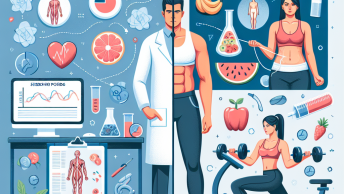10 Essential Diet Tips for Better Health and Wellness
In today’s fast-paced world, maintaining a balanced diet can seem like an elusive goal. With an overwhelming amount of information available, it’s hard to know where to start. To help you navigate the labyrinth of dietary advice, we have compiled a list of ten essential diet tips that promise to revolutionize your approach to eating. These tips are rooted in science and practicality, ensuring you can easily integrate them into your lifestyle.
1. Embrace Whole Foods
Opt for whole, unprocessed foods whenever possible. Whole foods such as fruits, vegetables, grains, beans, nuts, and seeds are packed with nutrients and fiber, essential for maintaining optimal health. Processed foods often contain added sugars, unhealthy fats, and sodium, which can contribute to health issues like obesity and heart disease.
2. Prioritize Protein
Protein is a macronutrient that plays a crucial role in building and repairing tissues, supporting immune function, and maintaining muscle mass. Incorporate lean protein sources such as chicken, fish, tofu, legumes, and low-fat dairy into your meals to help you feel fuller for longer and maintain a healthy weight.
3. Hydrate, Hydrate, Hydrate
Staying hydrated is vital for overall health. Water supports various bodily functions, including digestion, nutrient absorption, and temperature regulation. Aim for at least 8-10 glasses of water per day, and consider increasing your intake if you are physically active or live in a warm climate. Remember, other beverages like herbal teas and water-rich fruits and vegetables can also contribute to your daily hydration needs.
4. Practice Mindful Eating
Mindful eating involves paying attention to the experience of eating, which can help you develop a healthier relationship with food. Take time to enjoy your meals without distractions, chew slowly, and listen to your body’s hunger and fullness cues. This practice can prevent overeating and enhance your appreciation for the flavors and textures of your food.
5. Limit Added Sugars
The consumption of added sugars is linked to various health issues, including obesity, type 2 diabetes, and heart disease. To reduce your intake, read food labels carefully, and choose products with little or no added sugars. Also, consider swapping sugary snacks for natural alternatives like fresh fruits, which provide essential vitamins and minerals along with natural sweetness.
6. Incorporate Healthy Fats
Healthy fats are essential for numerous bodily functions, including hormone production and nutrient absorption. Include sources of unsaturated fats like avocados, nuts, seeds, and olive oil in your diet. These fats can improve heart health and may even help with weight management when consumed in moderation.
7. Monitor Portion Sizes
Portion control is a critical component of maintaining a healthy diet. Overeating, even healthy foods, can lead to weight gain and associated health issues. Use smaller plates, pay attention to suggested serving sizes on food labels, and listen to your body’s hunger signals to help regulate portions.
8. Explore Plant-Based Meals
Incorporating more plant-based meals into your diet can have numerous health benefits, including reducing the risk of chronic diseases and improving digestive health. Plant-based diets are rich in fiber, antioxidants, and other essential nutrients. Start small by swapping a few meat-based meals each week with plant-based alternatives and gradually increase the frequency.
9. Plan Your Meals
Meal planning is a proactive approach to maintaining a balanced diet. It helps prevent last-minute food choices that are often less healthy. Schedule time each week to plan your meals, create a shopping list, and prepare some dishes in advance. Having nutritious options readily available can make sticking to your diet easier and more enjoyable.
10. Seek Professional Guidance
Finally, when in doubt, consult with a registered dietitian or nutritionist for personalized advice. They can help tailor a diet plan to your specific health needs and fitness goals. Additionally, embracing digital resources and supportive communities can bolster your dietary efforts. For insightful guidance and innovative diet strategies, consider exploring this resource: Click Here to learn more.
Incorporating these diet tips into your daily routine can dramatically enhance your health and wellness journey. Not only will you cultivate more energy and better physical health, but you’re also likely to develop a more positive relationship with food. Remember, the key to success is consistency, so be patient with yourself as you embark on this road to better nutrition.






